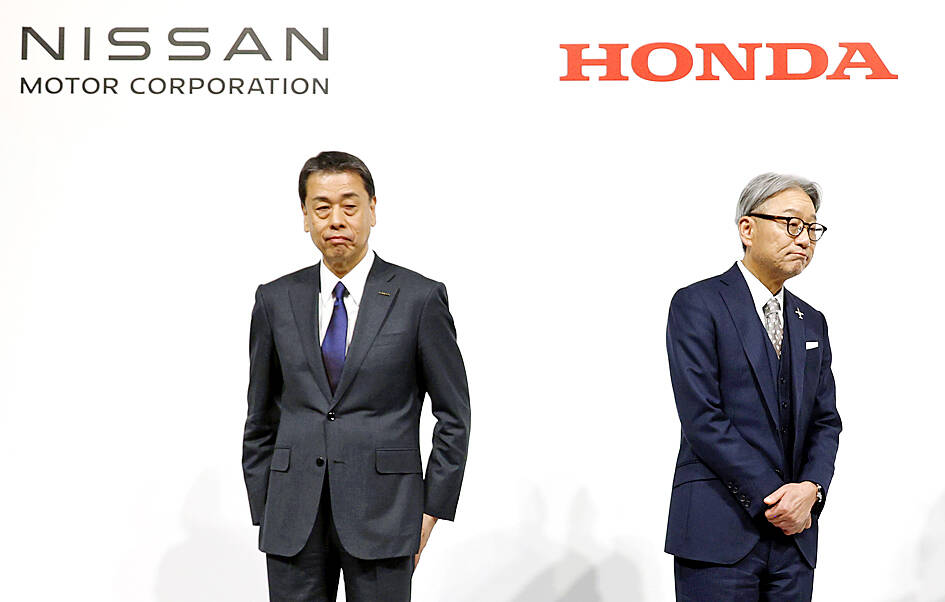Japan’s Nissan Motor Co has called off merger talks with rival Honda Motor Co, the Nikkei newspaper reported, abandoning a tie-up that would have created the world’s No. 3 automaker and raising questions about how it would drive a turnaround by itself.
Shares in Nissan slid more than 4 percent before trade was suspended by the Tokyo Stock Exchange following the report. Shares of Honda continued to trade and finished the day up more than 8 percent, in a sign of apparent investor relief that the deal had been scrapped.
Honda, Japan’s second-largest automaker, and Nissan, its third-largest, last year said they were in discussions to merge and create the world’s third-largest automaker by sales, bulking up in an industry that faces a vast threat from China’s BYD Co (比亞迪) and other electric-vehicle entrants, but the talks have been complicated by growing differences on both sides, according to two people familiar with the matter, both of whom declined to be identified because they were not authorized to speak to the media.

Photo: EPA-EFE
Honda had sounded out Nissan about becoming a subsidiary, one of the people said, adding that such an arrangement was a departure from the spirit of discussions originally framed as a merger of equals.
A Nissan spokesperson said that the Nikkei report was not based on information announced by the company, and that it aimed to finalize its future direction by the middle of this month and would announce it at that time.
A Honda spokesperson said it had not heard anything from Nissan about a decision to withdraw from their memorandum of understanding to work on a merger.
The development raises fresh questions about how hard-hit Nissan could ride out its latest crisis without external help. Nissan is in the middle of a turnaround plan, aiming to cut 9,000 employees and 20 percent of global capacity.
Honda, with a market value nearly five times bigger than Nissan, was increasingly worried about its smaller rival’s progress on the turnaround plan, the other person said.
The tie-up talks have coincided with the disruption posed by potential tariffs from US President Donald Trump.
Tariffs against Mexico would be more painful for Nissan than for Honda or Toyota Motor Corp, analysts said.
“Investors may get concerned about Nissan’s future [and] turnaround,” Morningstar analyst Vincent Sun said. “Nissan also has a larger risk exposure to US-Mexico tariffs than Honda and Toyota.”
Nissan has been hit harder than some other automakers by the shift to electric vehicles, having never fully recovered after years of crisis sparked by the arrest and removal of former chairman Carlos Ghosn in 2018.
“The news saying that Nissan did not want to be a Honda subsidiary appears to highlight that control was a contentious issue,” said Christopher Richter, Japan autos analyst at brokerage CLSA. “Without being able to have control, Honda appears to be walking away.”
Nissan’s long-term alliance partner Renault SA had said that it would be open in principle to the merger with Honda.
The French automaker owns 36 percent of Nissan, including 18.7 percent through a French trust.
Nissan and Honda had initially said they planned to decide the direction of the integration by the end of last month, but that was later pushed back to the middle of this month.

Greek tourism student Katerina quit within a month of starting work at a five-star hotel in Halkidiki, one of the country’s top destinations, because she said conditions were so dire. Beyond the bad pay, the 22-year-old said that her working and living conditions were “miserable and unacceptable.” Millions holiday in Greece every year, but its vital tourism industry is finding it harder and harder to recruit Greeks to look after them. “I was asked to work in any department of the hotel where there was a need, from service to cleaning,” said Katerina, a tourism and marketing student, who would

i Gasoline and diesel prices at fuel stations are this week to rise NT$0.1 per liter, as tensions in the Middle East pushed crude oil prices higher last week, CPC Corp, Taiwan (台灣中油) and Formosa Petrochemical Corp (台塑石化) said yesterday. International crude oil prices last week rose for the third consecutive week due to an escalating conflict between Israel and Iran, as the market is concerned that the situation in the Middle East might affect crude oil supply, CPC and Formosa said in separate statements. Front-month Brent crude oil futures — the international oil benchmark — rose 3.75 percent to settle at US$77.01

Merida Industry Co (美利達) has seen signs of recovery in the US and European markets this year, as customers are gradually depleting their inventories, the bicycle maker told shareholders yesterday. Given robust growth in new orders at its Taiwanese factory, coupled with its subsidiaries’ improving performance, Merida said it remains confident about the bicycle market’s prospects and expects steady growth in its core business this year. CAUTION ON CHINA However, the company must handle the Chinese market with great caution, as sales of road bikes there have declined significantly, affecting its revenue and profitability, Merida said in a statement, adding that it would

UNCERTAINTIES: The world’s biggest chip packager and tester is closely monitoring the US’ tariff policy before making any capacity adjustments, a company official said ASE Technology Holding Inc (日月光投控), the world’s biggest chip packager and tester, yesterday said it is cautiously evaluating new advanced packaging capacity expansion in the US in response to customers’ requests amid uncertainties about the US’ tariff policy. Compared with its semiconductor peers, ASE has been relatively prudent about building new capacity in the US. However, the company is adjusting its global manufacturing footprint expansion after US President Donald Trump announced “reciprocal” tariffs in April, and new import duties targeting semiconductors and other items that are vital to national security. ASE subsidiary Siliconware Precision Industries Co (SPIL, 矽品精密) is participating in Nvidia